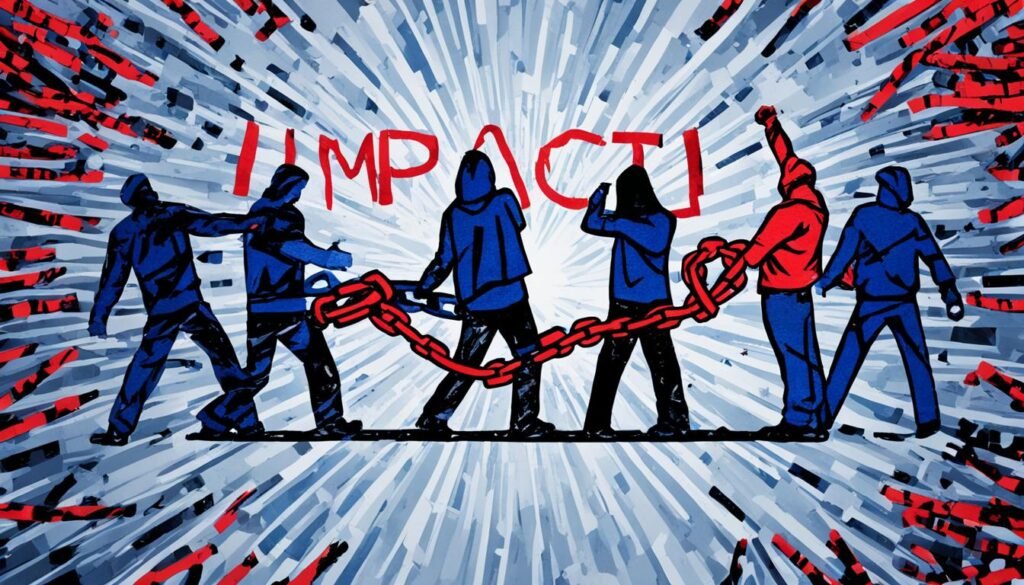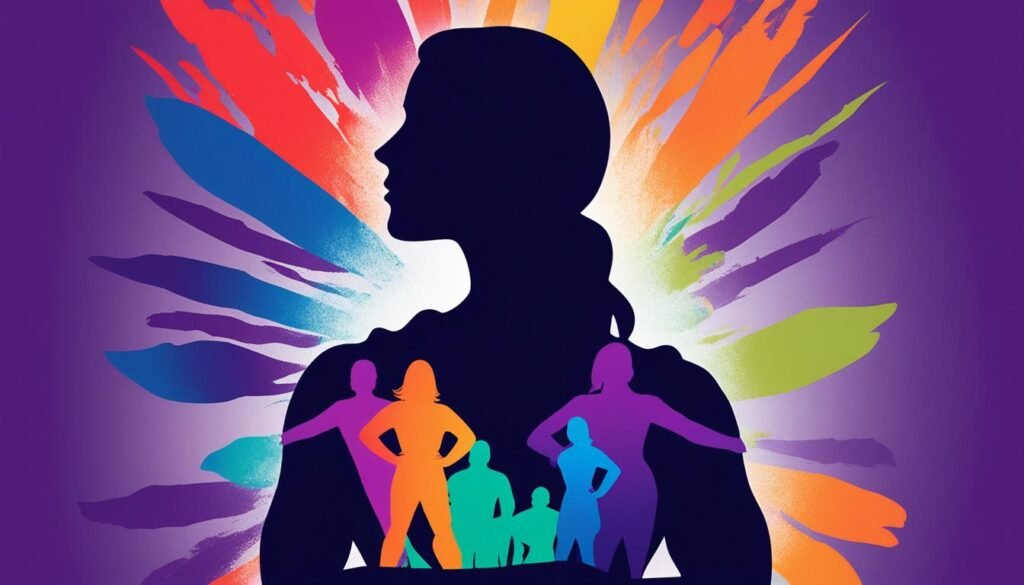Domestic violence is a big problem in California, with thousands of cases every year1. Victims in the state have important legal rights and support to help them leave abuse and start over. This guide will cover the main legal rights and resources for survivors of domestic violence in California. It aims to help you understand the legal system and find the support you need.
Key Takeaways
- California has strong laws to protect domestic violence victims, like restraining orders, workplace safety, and criminal penalties for abusers.
- Domestic violence includes many types of abuse, from hitting to emotional, sexual, and financial harm.
- Victims can get legal help, counseling, and other support to deal with the legal system and move forward.
- Domestic violence affects child custody and visitation rights, and courts look at the safety and well-being of kids.
- California has new laws, like the Justice for Survivors Act, to give more support and legal help to domestic violence survivors.
Understanding Domestic Violence in California Law
In California, domestic violence means hurting or threatening someone you’re close to. This includes spouses, ex-spouses, people you live with, or those you have a child with. It also covers dating partners or those you’ve had a sexual relationship with2. Abuse can be physical, emotional, sexual, economic, or anything that makes someone fear for their safety2.
Definition of Domestic Violence
California’s law says domestic violence is using or threatening to use physical force on someone you’re close to3. This includes many harmful actions, like hurting someone on purpose, sexual assault, stalking, and more2.
Types of Abusive Behavior Covered
Domestic violence in California covers many kinds of abuse. This includes hitting, emotional harm, sexual abuse, controlling someone’s money, and more. These cases are often not reported because victims are scared or don’t know what to do2.
If you’re a victim of domestic violence in California, you can get legal help by getting a restraining order2. This order stops the abuser from being violent or bothering you again. It can also mean they can’t come near your home or work2.

It’s important to know about domestic violence laws in California. This helps victims get the justice and support they need342.
Rights of Domestic Violence Victims in the Workplace
In California, domestic violence victims have important legal rights at work. Employers with 25 or more workers must let employees take time off for medical care after a crime or abuse. This includes visits to domestic violence shelters, rape crisis centers, and victim services5. Workers don’t need to show proof to take leave for domestic violence, sexual assault, stalking, or other crimes that hurt them physically or mentally5.
Right to Take Time Off
California law lets domestic violence victims take time off to get help, like a restraining order, to stay safe5. They can use paid or unpaid leave for this5. Plus, up to 12 weeks of unpaid leave may be available for serious health issues under federal and California laws6.
Right to Reasonable Accommodation
Employers must make changes to keep employees safe who are dealing with domestic violence. This could mean installing locks or moving the employee to a different job5. Victims can ask for and get things like a job change, a new schedule, and more if they tell their employer about their situation6. Employers can’t punish or discriminate against employees who are victims of domestic violence or who ask for safety changes at work5. If an employee faces retaliation or bias, they can report it to the Labor Commissioner’s Office5.

“Domestic violence victims deserve a safe and supportive work environment. California’s laws provide essential protections to help them achieve that.”
Criminal Charges and Penalties for Domestic Violence
Domestic violence in California includes many types of abuse, like hitting, threats, and neglect. These crimes can be charged as either misdemeanors or felonies, based on the situation7.
Common Domestic Violence Crimes
If caught for misdemeanor domestic violence in California, you could face fines and up to a year in jail7. Felony charges can lead to four years in prison and fines up to $10,0007. California law says domestic violence can happen between spouses, ex-spouses, people living together, parents of a child, fiancés, or those in a dating relationship8.
Charges under California law can be either misdemeanors or felonies. Section 273.5 covers serious injuries, while section 243(e)(1) includes any kind of battery8. Section 273.5 requires a serious injury, but section 243(e)(1) doesn’t8.
Being convicted of domestic violence in California can lead to losing your gun rights and affecting child custody7. Even if not convicted, being accused can harm your reputation and relationships7.
Knowing about domestic violence crimes and their penalties in California helps people understand the legal system better. It also helps them find the right support and resources78.
Legal rights for domestic violence victims California
Domestic violence victims in California have legal rights that protect their safety, jobs, and homes. The Violence Against Women Act (VAWA) of 1994 made domestic violence a national crime. It also set up a system for victim rights and support9.
California law covers a wide range of abuse, like physical and sexual assault, threats, and emotional abuse10. Victims can get protective orders to stop further violence. These include Emergency Protective Orders (EPOs), Temporary Restraining Orders (TROs), and Permanent Restraining Orders (PROs)10.
Those who commit domestic violence in California can face serious charges. The state requires police to arrest if there’s evidence of violence10. Offenders may lose their right to own guns and could get jail time, fines, probation, and counseling10.
California also helps victims with counseling, shelters, and legal aid to start over10. Victims can take time off work for the violence and ask for workplace changes without fear of backlash9.
Women hit by domestic violence in California often struggle to keep a home11. To help, California laws let victims ask landlords to change locks quickly, break a lease for safer housing, and stop eviction due to abuser issues11.
Domestic violence victims in California have many legal rights and resources. These help them get through tough times. Knowing these rights helps victims deal with the legal system and get the support they need to keep safe and protect their families.
Protection and Support for Victims
If you’re a victim of domestic violence in California, you can get restraining orders to protect you and your kids12. These orders make the abuser stay away, leave your home, and stop contacting you. Breaking a restraining order can lead to serious legal trouble for the abuser13.
Restraining Orders
Restraining orders are a key legal tool for your safety. They force the abuser to keep their distance, leave your home, and stop all contact. This lets you start healing and rebuild your life12. If the abuser breaks a restraining order, they could face criminal charges13.
Victim Assistance Programs
California also has many programs to help domestic violence victims12. These programs offer crisis hotlines, legal help, and emergency shelters. They also have bilingual support so everyone can get the help they need12. You can find these services in many cities across California, making them easy to reach12.
| Organization | Services Offered | Contact Information |
|---|---|---|
| California Partnership to End Domestic Violence | Crisis line, legal assistance, shelter | 1-800-524-4765 (crisis line), www.cpedv.org |
| Domestic Violence Assistance Program | Crisis intervention, counseling, emergency housing | 1-909-383-1122, www.dvaprogram.org |
| Asian Pacific Islander Legal Outreach | Legal advocacy, language assistance, community education | 1-415-567-6255, www.apilegaloutreach.org |
These programs offer a lot of support to help you through the legal process, find resources, and start healing12. Contact these groups to learn how they can help you as a domestic violence victim in California12.
“Victims have the right to refuse interviews with defendants, receive notice of proceedings, and be heard at relevant legal stages.”13
Impact on Child Custody and Visitation Rights
Domestic violence can greatly affect child custody and visitation rights in California. The legal term for domestic violence in custody cases is wider than the criminal term. It includes abuse against the child, the child’s other parent, or other family members14.
In California, domestic violence can change custody rules for children. If a parent has been convicted of violence against the other parent or if violence was found to have happened in the last 5 years, special rules apply14. Usually, the abusive parent can’t get custody14. But, they might still get visitation rights14.
A parent with a history of domestic violence might get custody if it’s best for the children. They must complete a 52-week batterer program, get substance abuse counseling if needed, and finish a parenting class14. They also need to follow probation or parole, respect restraining orders, and not commit more violence14.
If parents can’t agree on custody in domestic violence cases, they might need mediation14. This helps create a plan that keeps the children safe and decides on living arrangements and decision-making14. Trained mediators focus on keeping everyone safe and making sure the children are protected14. In these cases, separate mediation sessions can be arranged, and support people can be there during the process14.
Supervised visitation might be ordered if there’s a history of domestic violence or other issues14. The court will say what the visitation will be like, including when, how long, and where it happens14.
Seeing domestic violence at home can hurt children a lot14. It can make them more likely to be abused or neglected14. Even if they’re not directly hurt, they can still suffer from the effects of violence14.
California defines domestic violence broadly, covering many harmful behaviors15. Domestic violence orders in California can include things like stalking and threatening15.
California’s laws focus on keeping children safe and well in domestic violence cases15. When deciding on custody, judges look at a parent’s history of abuse or violence15.
If a parent has been violent in the last five years, California law might think it’s not good for the child to live with them15. But, the parent can try to show that living with them is best for the child15. Completing treatment programs is considered15.
Judges might need proof of abuse in custody cases, like police reports15. They can make temporary custody orders quickly if a child is in danger, like if there’s been recent violence15. In domestic violence cases, judges might limit visitation for the abusive parent and suggest supervised or virtual visits for the child’s safety15.
California’s laws and courts focus on protecting children in domestic violence cases15. They aim to keep the children safe and well. The complex rules around custody and visitation in these cases show why victims should get legal advice to protect their family’s future.
Conclusion
Domestic violence is a serious issue in California, but there are legal rights and protections for victims16. These rights include 12 specific ones, like being protected from the defendant and refusing interviews or discovery requests16. Victims rely on the government and the criminal justice system to be treated fairly and safely17.
Victims of domestic violence in California can get workplace help, criminal penalties for their abusers, restraining orders, and victim support programs17. Their rights also matter in child custody cases17. If you’re a victim, call Super Attorneys Of Irvine at 949-996-9546 for legal help and support16. You don’t have to face this alone.
With the legal rights and resources available, victims of domestic violence in California can fight for justice, safety, and support1617.
FAQ
What is the legal definition of domestic violence in California?
What types of abusive behavior are covered under California’s domestic violence laws?
What workplace rights do domestic violence victims have in California?
What are the criminal charges and penalties for domestic violence in California?
What legal rights do domestic violence victims have in California?
What types of protection orders are available for domestic violence victims in California?
How does domestic violence impact child custody and visitation rights in California?
Source Links
- https://www.orangecountyfamilylaw.com/blog/california-domestic-violence-laws/
- https://safefjc.org/what-is-the-legal-definition-of-domestic-violence-in-california/
- https://www.shouselaw.com/ca/defense/laws/domestic-violence/
- https://www.robertmhelfend.com/criminal-defense/domestic-violence/california-domestic-abuse-laws/
- https://www.dir.ca.gov/dlse/victims_of_domestic_violence_leave_notice.pdf
- https://www.dir.ca.gov/dlse/Domestic-Violence-and-the-Rights-of-Domestic-Violence-Victims.html
- https://www.palmdalecriminaldefenselawfirm.com/2023/11/what-is-the-maximum-time-for-domestic-violence-in-california/
- https://www.foosgavinlaw.com/areas-of-service/criminal-defense/domestic-violence/spousal-abuse
- https://www.justice.gov/usao-cdca/domestic-violence-laws
- https://www.velasquezlawoffice.com/domestic-violence-in-california/
- https://www.fosterhsu.com/the-california-civil-codes-that-protect-domestic-violence-victims-housing-rights/
- https://www.cpedv.org/domestic-violence-organizations-california
- https://oag.ca.gov/victimservices/content/bill_of_rights
- https://www.courts.ca.gov/1268.htm
- https://www.divorcenet.com/resources/how-domestic-violence-affects-child-custody-california.html
- https://www.cdcr.ca.gov/victim-services/marsys-law/
- https://law.lclark.edu/live/files/4920-california

